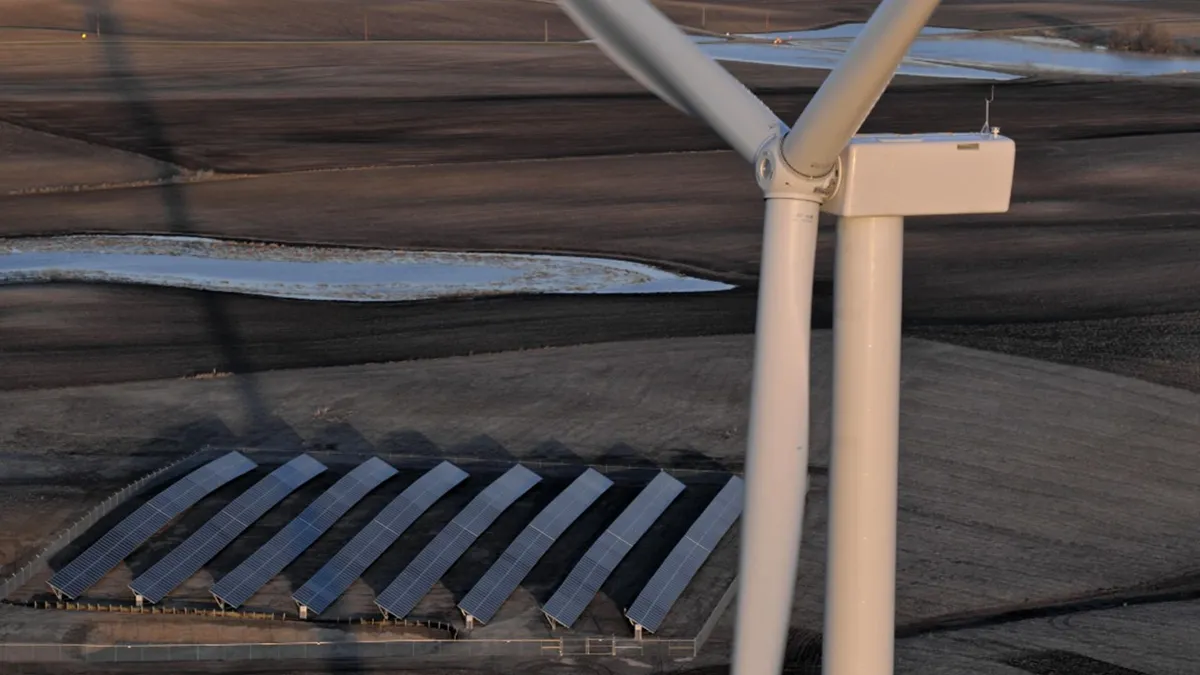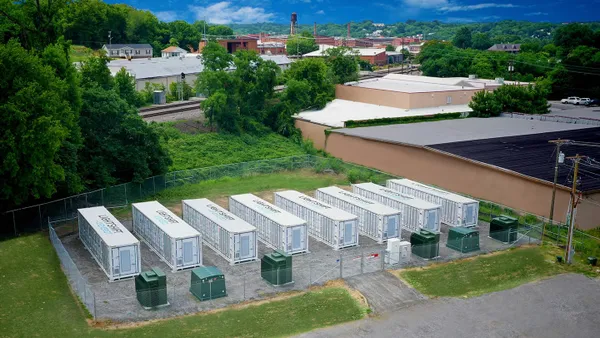UPDATE: Dec. 23, 2020: The Virginia State Corporation Commission last week adopted rules to increase energy storage deployment in the state, requiring Dominion and Appalachian Power Company to propose 250 MW and 25 MW of storage resources, respectively, by the end of 2025. The rules stem from the Virginia Clean Economy Act which, among other things, requires ApCo and Dominion to seek an additional 400 MW and 2700 MW, respectively, of storage to their resource mix by 2035.
“The Virginia State Corporation Commission has taken an important step toward advancing the state’s clean energy future by setting forth rules to guide the nation’s largest state procurement target of energy storage,” Kelly Speakes-Backman, CEO of the U.S. Energy Storage Association, said in a statement.
Dive Brief:
- The Virginia State Corporation Commission (SCC) on Friday issued a proposed rule to put Dominion Energy and the Appalachian Power Company (APCo) on a path toward 2.7 GW and 400 MW, respectively, of energy storage by 2035.
- Storage targets were set under the Virginia Clean Economy Act (VCEA), signed into law in April, and the law requires state regulators to issue final regulations by January 1, 2021. The proposal contains many of the suggestions that Dominion submitted to the commission, a company spokesperson said in an email. "Energy storage is critical to providing continued reliability for our customers as we expand our renewable portfolio," according to Dominion.
- However, the proposed regulations would make it difficult for third parties to participate in Virginia's energy storage market, David Murray, executive director of the Maryland-DC-Delaware-Virginia Solar Energy Industries Association, said in an email. "The Commission pretty much copy and pasted what the utilities gave them," he said. MDV-SEIA intends to push back during the comment period.
Dive Insight:
The proposal would apply to APCo and Dominion's deployment of the mandated energy storage and includes interim targets. It would also regulate non-utility energy storage aggregators, developers, and owners.
Energy storage targets for Dominion would be 250 MW by December 31, 2025; and an additional 950 MW by December 31, 2030, for a total of 1.2 GW; and a further 1.5 GW by December 31, 2035, for a total of 2.7 GW.
APCo's targets would be 25 MW by December 31, 2025; an additional 125 MW by December 31, 2030, for a total of 150 MW; and a further 250 MW by December 31, 2035, for a total of 400 MW. The investor-owned utilities would be required to obtain at least 35% of the energy storage from other parties and storage purchased from utility-affiliated interests would not count toward that threshold.
The utilities would be required to seek commission approval for behind-the-meter and demand response incentives and any proposed non-wire alternatives.
Non-utility developers seeking to build energy storage in Virginia would be required to submit permit applications with information about the environmental and community impacts of any proposed project. Energy storage aggregators would be required to apply for licensing with the commission.
"GRID Alternatives Mid-Atlantic is glad to see that the Commission proposes to require utilities to consider environmental justice, but we believe there's room for the rules to do much more to make sure incentives for behind-the-meter energy storage are equitable," Policy and Regulatory Manager Alexandra Wyatt said in an email. "Without thoughtful and deliberate targeting of incentives, under-served communities may miss out on the benefits of energy storage, including resilience benefits," she said.
Dominion issued a request for proposal earlier this year for 250 MW of energy storage toward its VCEA targets, according to a company spokesperson. The company has battery storage pilots already approved and scheduled to go online in Virginia next year, and intends to remain engaged in the rulemaking process as the SCC establishes its final rule.
Although the SCC's proposal does not cover cooperatives, "battery storage is an important emerging technology for co-ops," Steven Johnson, director of member & public relations for the Virginia, Maryland & Delaware Association of Electric Cooperatives (VMDAEC) said in an email. Both the Old Dominion Electric Cooperative and Rappahannock Electric Cooperative have energy storage initiatives.
"In passing the VCEA, the General Assembly recognized these types of storage mandates were inappropriate for non-for-profit, member-owned distribution cooperatives," VMDAEC's Johnson said. However, the group continues to examine issues related to utility-owned and third-party owned storage in co-op service territories.
Comments on the proposed rule are due by Nov. 2. VCEA also contains mandates for utility ownership for solar and wind generation – the state's utilities must own or operate up to 5 GW of offshore wind generation.













